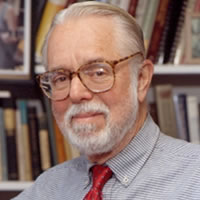 Harvey Cox, Hollis Research Professor of Divinity at Harvard, begins a chapter he contributed to The Seven World Religions Introduced by Preeminent Scholars from Each Tradition (1993, Arvind Sharma, ed.) by describing what “the proverbial visitor from Mars” would note if given the opportunity to travel to earth to observe Christians. After covering the dizzying diversity of the religious gatherings and the shared oddities (e.g. “the people would sometimes swallow small quantities of bread or a wafer and sip tiny amounts of wine, and at other times they would sprinkle small children and babies with water or immerse adults or teenagers completely in a special pool”), he suggests that eventually the Martian would be able to discern the one area of substantive agreement:
Harvey Cox, Hollis Research Professor of Divinity at Harvard, begins a chapter he contributed to The Seven World Religions Introduced by Preeminent Scholars from Each Tradition (1993, Arvind Sharma, ed.) by describing what “the proverbial visitor from Mars” would note if given the opportunity to travel to earth to observe Christians. After covering the dizzying diversity of the religious gatherings and the shared oddities (e.g. “the people would sometimes swallow small quantities of bread or a wafer and sip tiny amounts of wine, and at other times they would sprinkle small children and babies with water or immerse adults or teenagers completely in a special pool”), he suggests that eventually the Martian would be able to discern the one area of substantive agreement:
. . . gradually the alert visitor would begin to piece together some of the bedrock elements on which all who call themselves “Christian” do agree. Most important, the visitor would constantly hear a name and would discover that all these people, despite their dramatic differences, claim to base their faith on an otherwise obscure Jewish teacher and prophet who lived for only about thirty-three years in a remote outpost of the Roman Empire nearly two thousand years ago. Some hold that this Jesus of Nazareth was – and is – the Son of God or the actual “incarnation” of the Creator of the universe. Others believe that he is the principal bearer of the gospel, the message about the coming of God’s reign of justice and peace, to humankind. Still others see him as the prime exemplar of God’s will for all people, a model of what human life is meant to be and what it might become. Persisting in his inquiry, the investigator would also find that there is a widespread agreement among Christians that this Jesus should have considerable significance – some would say the greatest significance – for how they lead their lives and make their moral decisions. So, if the visitor stuck with this daunting task, the core of it all would finally begin to emerge. The outside visitor would find that although they may differ about virtually everything else, all Christians agree that Jesus is pivotal and indispensable to Christianity (p.360-361).
So What?
In recent decades there has been a significant increase in both intra- and inter-religious dialogue. Within Christianity some groups that were already close together theologically have crafted bonds that allow greater collaboration functionally. So far, however, there have been no movements that have successfully crafted any form of functional unity. Whether or not the proliferation of denominations continues (some now catalog over 30,000 unique Christian denominations) and whether or not any large scale endeavors toward functional unity occur, it is helpful to seek to understand what holds over 2 billion people together within a single religion: Christianity.
- Do you agree with Cox that “all Christians agree that Jesus is pivotal and indispensable to Christianity” (or at least nearly all)?
- What else (if anything) would you add to the list of what all (or nearly all) Christians have in common today?